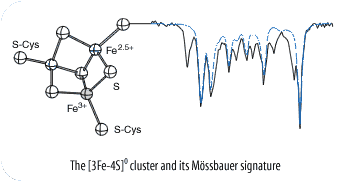 |
 Eckard Münck, Professor of Chemistry at Carnegie Mellon University, is a pioneer of the biophysics of metalloproteins. His more than 200 publications have established
Mössbauer spectroscopy as a primary tool for studying proteins containing complex iron centers. Over the past thirty years, he has unraveled the electronic structures of metal clusters in numerous iron-sulfur proteins and iron-oxo enzymes and revealed the molecular mechanism by which many important enzymes activate molecular oxygen and catalyze reactions essential to life. He discovered the first example of a coupled chromophore assembly in the enzyme sulfite reductase, elucidated the structure of 3Fe-clusters, provided final spectroscopic proof for almost all molecular systems containing Fe(IV) known to present, and demonstrated the existence of double and antisymmetric exchange in molecular systems. Eckard Münck's inventive analyses have turned spin physics into a powerful tool for structure determination. Eckard Münck, Professor of Chemistry at Carnegie Mellon University, is a pioneer of the biophysics of metalloproteins. His more than 200 publications have established
Mössbauer spectroscopy as a primary tool for studying proteins containing complex iron centers. Over the past thirty years, he has unraveled the electronic structures of metal clusters in numerous iron-sulfur proteins and iron-oxo enzymes and revealed the molecular mechanism by which many important enzymes activate molecular oxygen and catalyze reactions essential to life. He discovered the first example of a coupled chromophore assembly in the enzyme sulfite reductase, elucidated the structure of 3Fe-clusters, provided final spectroscopic proof for almost all molecular systems containing Fe(IV) known to present, and demonstrated the existence of double and antisymmetric exchange in molecular systems. Eckard Münck's inventive analyses have turned spin physics into a powerful tool for structure determination.
 This symposium honors Eckard Münck on the occasion of his 65th birthday and provides an exciting overview of research bridging chemistry, biochemistry and physics. Born in Hagen (Germany) in 1938, Professor Münck earned his Ph.D. in Physics at the Technical University of Darmstadt (Germany) in 1967. He has held faculty positions at the University of Illinois and at the University of Minnesota, where he became the acting director of the Gray Freshwater Biological Institute. He moved to Carnegie Mellon in 1990. He is a coveted collaborator for more than 20 groups worldwide and an inspiring teacher and mentor to dozens of graduate students and postdoctoral fellows. This symposium honors Eckard Münck on the occasion of his 65th birthday and provides an exciting overview of research bridging chemistry, biochemistry and physics. Born in Hagen (Germany) in 1938, Professor Münck earned his Ph.D. in Physics at the Technical University of Darmstadt (Germany) in 1967. He has held faculty positions at the University of Illinois and at the University of Minnesota, where he became the acting director of the Gray Freshwater Biological Institute. He moved to Carnegie Mellon in 1990. He is a coveted collaborator for more than 20 groups worldwide and an inspiring teacher and mentor to dozens of graduate students and postdoctoral fellows.
|
 |

 Eckard Münck, Professor of Chemistry at Carnegie Mellon University, is a pioneer of the biophysics of metalloproteins. His more than 200 publications have established
Eckard Münck, Professor of Chemistry at Carnegie Mellon University, is a pioneer of the biophysics of metalloproteins. His more than 200 publications have established

 Eckard Münck, Professor of Chemistry at Carnegie Mellon University, is a pioneer of the biophysics of metalloproteins. His more than 200 publications have established
Eckard Münck, Professor of Chemistry at Carnegie Mellon University, is a pioneer of the biophysics of metalloproteins. His more than 200 publications have established